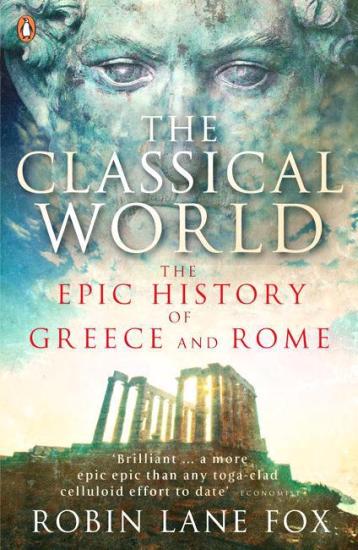
Series: Book 1 in the Novels series
Rating: Not rated
Tags: EN-Alire, Lang:en
Summary
The classical civilizations of Greece and Rome once
dominated the world, and they continue to fascinate and
inspire us. Classical art and architecture, drama and epic,
philosophy and politics-these are the foundations of Western
civilization. In
The Classical World, eminent classicist Robin Lane
Fox brilliantly chronicles this vast sweep of history from
Homer to the reign of Hadrian. From the Peloponnesian War
through the creation of Athenian democracy, from the
turbulent empire of Alexander the Great to the creation of
the Roman Empire and the emergence of Christianity, Fox
serves as our witty and trenchant guide. He introduces us to
extraordinary heroes and horrific villains, great thinkers
and blood-thirsty tyrants. Throughout this vivid tour of two
of the greatest civilizations the world has ever known, we
remain in the hands of a great master.
Starred Review. Framing this history of the
classical world as he imagines the second-century Emperor
Hadrian (who traveled the classical world and had a
"classicizing mind") would have done, this scintillating
survey seeks to understand Greek and Roman civilizations on
their own terms. Oxford historian Fox (
Alexander the Great) structures his study around the
ancient concepts of freedom, justice and luxury, as they
evolved from Homeric literature onward. The story arranges
itself around two poles: democratic Athens, of which, for all
its flaws, Fox is an unabashed partisan, and Rome, whose
fatally unequal republic declined into the grotesque tyranny
of the early empire. This intellectual framework provides an
interpretive skeleton for a loosely structured, well-paced
narrative history. (One disappointment, a major one for an
"epic history," is Fox's sketchy, montage-like treatment of
military campaigns.) Into the story the author weaves
insightful passages on art, religion, technology, marriage
and the prominent role of homosexuality in classical culture,
along with set-piece profiles of statesmen and thinkers from
Pericles to Plato to Pliny. Fox is a fluent, perceptive color
commentator on the pageant of ancient history, while giving
readers some idea of where the parade was headed. 71 b&w
illus.; 10 maps.
(Oct.)
Fox, the author of numerous works on classical
civilization, is a masterful writer whose elegant but highly
readable prose offers an evolving portrait of Greek and Roman
culture over a period of roughly 900 years. Although he
utilizes a broadly chronological approach, Fox goes well
beyond the usual, dreary narrative of battles, dynastic
changes, and political conflicts that often characterize
surveys of the period. Instead, Fox focuses on the gradual
development and transformation of various cultural aspects of
Greek and Roman societies, and he discusses in often
fascinating detail topics that are normally given short
shrift in general histories. For example, he provides an
excellent analysis of the social and political conditions
influencing the "overseas" Greek polities, in Sicily,
southern Italy, and Ionia. He examines puzzling historical
problems such as Hannibal's failure to win the support of
Italian client peoples who unexpectedly remained loyal to
Rome during the Second Punic War. This is an excellent work
of scholarship and literature and will be a valuable addition
to ancient-history collections.
Jay Freeman
From Publishers Weekly
Copyright © Reed Business Information, a division
of Reed Elsevier Inc. All rights reserved.From Booklist
Copyright © American Library Association. All rights
reserved